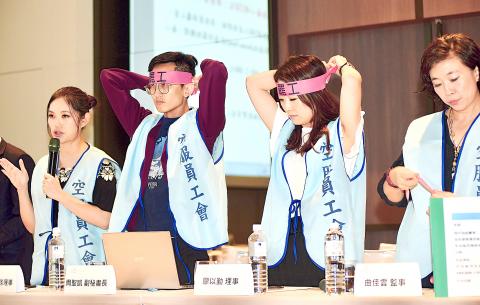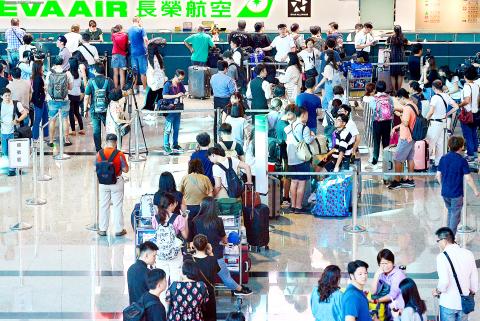EVA Airways Corp (長榮航空) flight attendants yesterday went on strike after a round of employer-employee negotiations broke down, with more than 8,000 passengers expected to be affected by midnight.
The main sources of contention between the carrier and the Taoyuan Flight Attendants’ Union remained a proposal to raise the daily allowance for flight attendants and an appeal, dubbed the “free-rider clause,” by the union that non-union employees be barred from receiving benefits that the airline promises the union in negotiations.
EVA officials took a hard stance and refused to budge on the two items, issuing responses that were identical to those given two years ago when the union first raised the issues.

Photo: Chien Jung-fong, Taipei Times
Citing the airline’s “unreasonable distribution” of revenue, union standing director Lee Ying (李瀅) said that EVA employees who have stuck with the airline through times of hardship, such as in the aftermath of the Sept. 11, 2001, terror attacks on the US, and the 2008 to 2009 global economic crisis, have not been allowed to taste the fruits of the company’s steadily growing revenue over the past several years.
However, EVA president Clay Sun (孫嘉明) said that the airline has over the past few years been paying employees up to 16 times their monthly salary when including bonuses, adding that it has also been steadily raising their wages each year.
EVA flight attendants receive a larger daily allowance than their counterparts at China Airlines Ltd (中華航空), as EVA calculates from the time they sign in to the time they sign out of work, while China Airlines calculates based on flight hours, EVA cabin crew division deputy vice president Milly Fung (馮美莉) said.

Photo: Chu Pei-hsiung, Taipei Times
The hourly rate for the daily allowance paid to EVA flight attendants, NT$90, is comparable with international standards, she said, asking union representatives on what their demand for a NT$150 hourly rate was based.
Since 2016, the airline has increased employees’ monthly salaries by NT$3,000 to NT$5,000, EVA human resources division deputy vice president Shine Hsu (許平) said.
If the airline approved the free-rider clause, it would be unfair to non-union employees, who would be paid less for doing the same work, which would negatively affect morale and flight safety, Hsu said.
The talks reached a deadlock after an hour and the union announced that it would begin the strike at 4pm.
Sun later said that the strike has caused the airline to cancel 16 international flights, but added that it would strive to mitigate the effects on passengers.
A total of 8,628 passengers were affected by the canceled international flights, EVA said, but added that 14 international flights were unaffected, as were 2,982 passengers on domestic flights.
As of press time last night, the airline said that it would cancel 26 inbound flights — including from Bangkok; Ho Chi Minh City, Vietnam; Manila; Seoul; and Hong Kong to Taiwan Taoyuan International Airport; and from Guangzhou, China, to Kaohsiung — and 45 outbound flights.
“We cannot be sure of how many flight attendants will be on duty, but we will try to maintain 50 percent of all flights unchanged,” EVA operations management department deputy senior vice president Bryan Chang (張玉珩) told reporters.
EVA has about 4,600 flight attendants, of whom 2,949 on June 7 voted in favor of going on strike, the union said.
The airline, which operates an average of 80 international flights per day, might have about 1,600 flight attendants who can work during the strike and said that it welcomes union members to return to work at any time.
Priority would be given to short-haul flights and long-haul flights arriving from or departing for Los Angeles and San Francisco, as they are important transportation hubs, in a bid to reduce the effects of the strike on foreign travelers, Chang said.
EVA said it would help passengers transfer to other airlines and pay compensation of up to US$250 per traveler if their schedules are delayed more than six hours.
Sun dismissed an accusation by the union that the carrier did not compromise in earlier talks, saying that EVA has expressed its willingness to raise the safety bonus for crew.
“When the strike ends will depend on the union, but we urge them to end it soon, as the nation’s aviation and tourism industries will be affected if the strike continues for a long time,” Sun said.
The airline cannot agree with the “free-rider clause” and would not change its stance, he said.
The Ministry of Transportation and Communications activated its emergency response plan immediately after the union announced that it would go on strike, Minister of Transportation and Communications Lin Chia-lung (林佳龍) said, adding that he hoped both sides would sit down and resume negotiations.
Lin, who is in Belize on an official visit, made the remarks in a video published online.
He said that he is making arrangements to return to Taiwan as soon as he finishes his work in one of the nation’s most important Central American allies.
“I have asked the Civil Aeronautics Administration, the Tourism Bureau, Taoyuan International Airport Corp, EVA Airways, Uni Air, China Airlines, Mandarin Airlines and bus operators to prepare to act based on the emergency response plan,” Lin said. “I have also requested that the Ministry of National Defense dispatch military aircraft to transport passengers to and from Lienchiang County. Meanwhile, the Ministry of Health and Welfare should be prepared to offer emergency air medical transportation for patients in outlying islands.”
Deputy Minister of Transportation and Communications Wang Kwo-tsai (王國材), who presided over a ministry emergency response meeting, said that it was unfortunate that the union decided to go on strike, even though the negotiations were an opportunity to let positions from both sides be known to the public.
As of last night, EVA’s domestic flight service had not been affected by the strike, Wang said, adding that domestic flights were expected to continue as scheduled today.
EVA would first help passengers transfer to other carriers, before helping them postpone their trips or cancel tickets, Wang said, adding that it would be responsible for compensating travelers for additional costs incurred from being stranded overseas.
At 7:30pm, about 700 striking flight attendants staged a sit-in outside EVA’s headquarters in Taoyuan’s Nankan (南崁).
At about 8:30pm, 1,000 people had joined the sit-in, the union said.
The entrance to the airline’s headquarters was blocked by union members, making it difficult for flight attendants who have volunteered to work during the strike to report for duty, Wang said.
The strike has also affected 28 tour groups, including 15 groups scheduled to leave and 11 groups that are returning to Taiwan, he said.
The Tourism Bureau and the Travel Agent Association are closely monitoring the situation, he added.
Taiwan International Airport Corp has arranged for transit passengers to rest in the C5, C6 and C7 areas of Terminal 2 or in hotels if they need to stay longer.
“The strike hurt mostly innocent passengers. We hope both sides are willing to make concessions and end the labor dispute as soon as possible, so that the airport can return to normal operation,” Wang said.
Additional reporting by Ann Maxon

GEARING UP: An invasion would be difficult and would strain China’s forces, but it has conducted large-scale training supporting an invasion scenario, the report said China increased its military pressure on Taiwan last year and took other steps in preparation for a potential invasion, an annual report published by the US Department of Defense on Wednesday showed. “Throughout 2023, Beijing continued to erode longstanding norms in and around Taiwan by employing a range of pressure tactics against Taiwan,” the report said, which is titled “Military and Security Developments Involving the People’s Republic of China (PRC) 2024.” The Chinese People’s Liberation Army (PLA) “is preparing for a contingency to unify Taiwan with the PRC by force, if perceived as necessary by Beijing, while simultaneously deterring, delaying or denying

PEACEFUL RESOLUTION: A statement issued following a meeting between Australia and Britain reiterated support for Taiwan and opposition to change in the Taiwan Strait Canada should support the peaceful resolution of Taiwan’s destiny according to the will of Taiwanese, Canadian lawmakers said in a resolution marking the second anniversary of that nation’s Indo-Pacific strategy on Monday. The Canadian House of Commons committee on Canada-Chinese relations made the comment as part of 34 recommendations for the new edition of the strategy, adding that Ottawa should back Taiwan’s meaningful participation in international organizations. Canada’s Indo-Pacific Strategy, first published in October 2022, emphasized that the region’s security, trade, human rights, democracy and environmental protection would play a crucial role in shaping Canada’s future. The strategy called for Canada to deepen

TECH CONFERENCE: Input from industry and academic experts can contribute to future policymaking across government agencies, President William Lai said Multifunctional service robots could be the next new area in which Taiwan could play a significant role, given its strengths in chip manufacturing and software design, Taiwan Semiconductor Manufacturing Co (TSMC, 台積電) chairman and chief executive C.C. Wei (魏哲家) said yesterday. “In the past two months, our customers shared a lot of their future plans with me. Artificial intelligence [AI] and AI applications were the most talked about subjects in our conversation,” Wei said in a speech at the National Science and Technology Conference in Taipei. TSMC, the world’s biggest contract chipmaker, counts Nvidia Corp, Advanced Micro Devices Inc, Apple Inc and

LEAP FORWARD: The new tanks are ‘decades more advanced than’ the army’s current fleet and would enable it to compete with China’s tanks, a source said A shipment of 38 US-made M1A2T Abrams tanks — part of a military procurement package from the US — arrived at the Port of Taipei early yesterday. The vehicles are the first batch of 108 tanks and other items that then-US president Donald Trump announced for Taiwan in 2019. The Ministry of National Defense at the time allocated NT$40.5 billion (US$1.25 billion) for the purchase. To accommodate the arrival of the tanks, the port suspended the use of all terminals and storage area machinery from 6pm last night until 7am this morning. The tanks are expected to be deployed at the army’s training